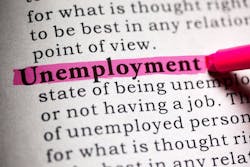How Will Record Unemployment Claims Affect The Housing Market?
A record 3.28 million Americans filed for unemployment support—in a single week. Economists say that when a recession happens, it usually builds. But because of the urgency to slow the coronavirus' spread, this time around seems to have hit all at once. The bad news for the home building industry is that people who have lost jobs are not in the market for a brand new home. But on the other hand, the conditions surrounding this downturn and the housing market’s solid foundation before this may lessen the blows. Additionally, the low inventory may have been a blessing in disguise, as experts do not expect home prices to dip too low.
As businesses across the United States have been mandated to close their doors in a desperate effort to slow the spread of COVID-19, people have been losing their jobs left and right. Now, we're seeing the first unemployment report since the first "shelter in place" orders, and it's far more grim than anyone had expected.
A record 3.28 million Americans filed for unemployment support in the week ending March 21—the most claims ever filed in a single week.
“Normally, when an economy goes into a recession it develops slowly over time," says realtor.com Chief Economist Danielle Hale. "That’s not happening this time around. ... It’s pretty clear that the economy is grinding to a halt pretty suddenly.”
